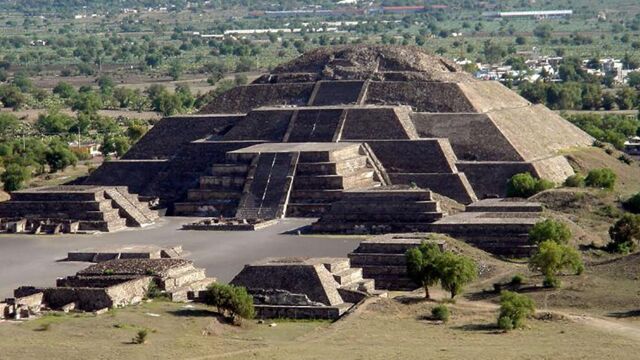After centuries of exploration, the Pyramid of the Moon still seems far from having revealed all its secrets. Part of the mystery surrounding this incredible 46-metre-high pre-Columbian monument built around the year 200 AD has just been uncovered: archaeologists have discovered, hidden in its depths, a hidden corridor leading to an enigmatic underground chamber. A possible passage to... the Underworld!
Discover our latest podcast
Archaeologists from the National Institute of Anthropology and History (INAH) in Mexico, supported by geophysicists from the National Autonomous University announced the discovery of signs indicating the likely presence of such structures.
Clues were provided by an underground imaging technique known as electrical prospecting, a technology based on the measurement of subsurface resistance variations; buried structures, depending on their nature, more or less limited the passage of electric currents.
Electrodes to model the basement
It was, therefore, with the help of electrodes planted on the surface of the pyramid that the archaeologists were able to explore their depths, without causing any damage to its millennia-old structure, considered the second most important of the region of Teotihuacan, an ancient city which constitutes one of the major archaeological sites of the valley of Mexico.
After several months of careful analysis, the scientists were finally able to confirm with certainty the first interpretations that were made last year, just after the data were obtained in the field.
'The cavity, which could have been a funereal space, is 15 metres wide and leads to the south of Plaza de la Luna, and further measurements have been made to locate the entrance to the tunnel, at eight metres depth,' said experts in a statement.
A possible ritual space
'The passage, which is eight metres deep, could have been a ritual space. [...] [Its] function could be to simulate the Underworld,' said Verónica Ortega, director of the conservation project at Plaza de la Luna. This hypothesis is supported by discoveries made some 30 years ago by two other archaeologists.
'During explorations conducted in the late 1980s via tunnels dug in the heart of the pyramid, archaeologists Rubén Cabrera and Saburo Sugiyama had discovered skeletons of individuals with cranial deformations, as similar figures in the Mayan region, as well as various objects in greenstone (necklaces, anthropomorphic figures made of mosaics), so it's not difficult to think that something similar could be found in the basement,' said Verónica Ortega.
This cluster of clues converges perfectly with theories that have been put forward so far, which didn't have any real certainty concerning the uses of this unusual monument.
'This immense complex of ritual offerings is the sacred heart of the city of Teotihuacan,' said Verónica Ortega. A city that, at its peak, had all the attributes of a true megacity and a population of about 125,000 inhabitants.
'Everyone sees it as a high place of civilization, hence the fact that what can be discovered in its heart can help unveil the relationship that this metropolis had with other Mesoamerican regions,' concluded Verónica Ortega. For centuries, archaeologists have scrutinized it, and now the Pyramid of the Moon could finally unveil some of its secrets.















